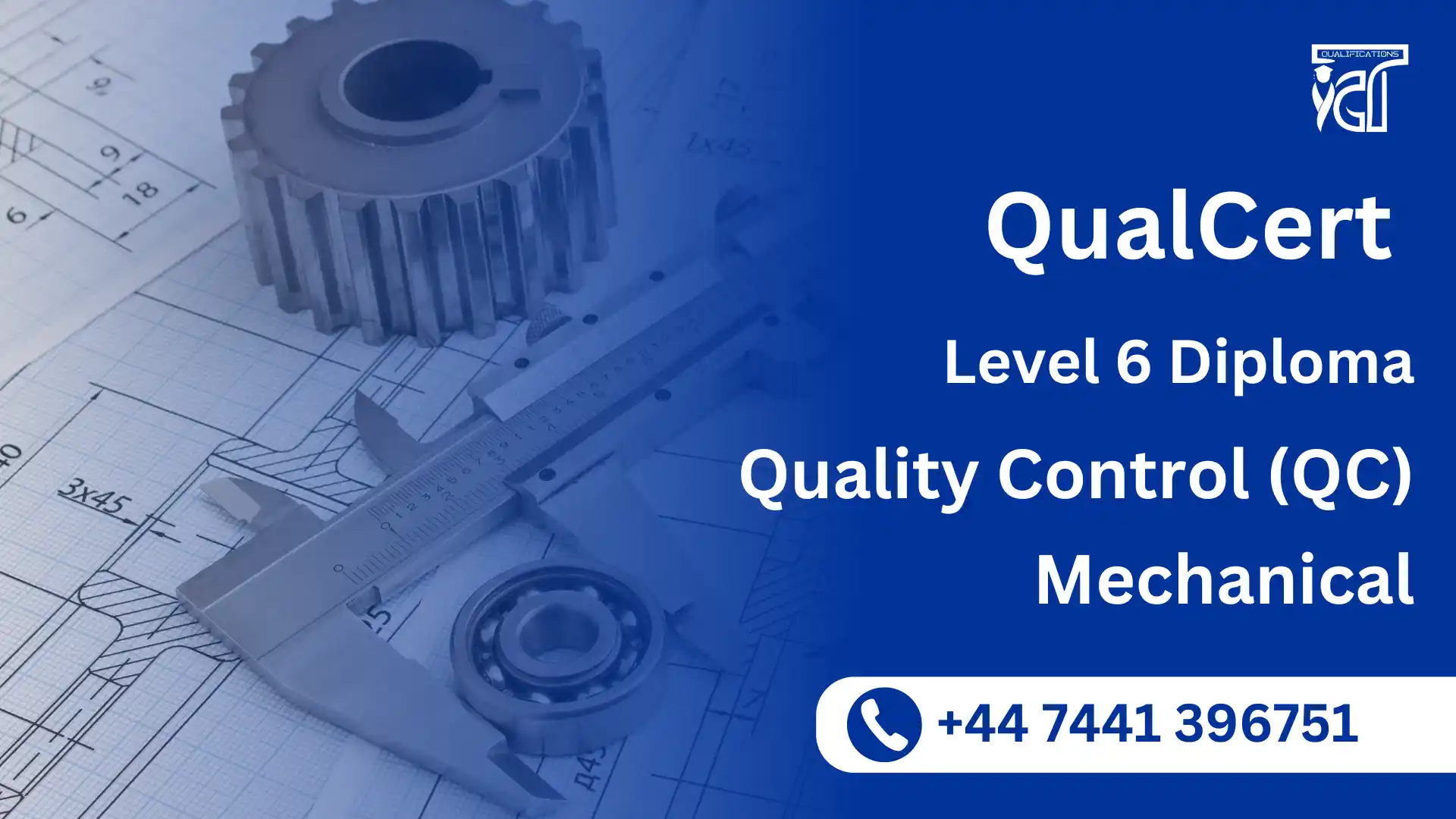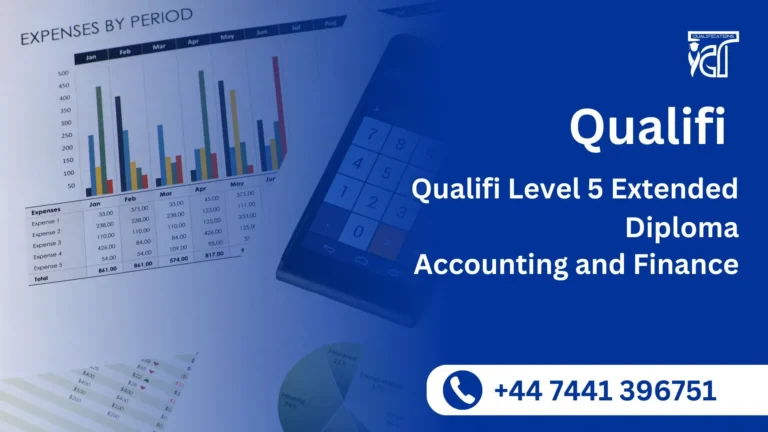The QualCert Level 6 Diploma in Quality Control (QC) Mechanical is a comprehensive and industry-focused qualification designed for professionals seeking to enhance their technical expertise and leadership skills in the field of mechanical quality control. This advanced diploma equips learners with the knowledge and tools required to monitor, manage, and improve quality systems in mechanical engineering environments.
This program emphasizes the application of international quality standards, inspection procedures, and testing methods used in mechanical systems across various industries such as manufacturing, construction, oil & gas, energy, and engineering services. It bridges the gap between theory and practical implementation, enabling learners to ensure the reliability, efficiency, and safety of mechanical processes and products.
Ideal for mid-level professionals, technicians, and quality inspectors, the course is structured to develop critical thinking, problem-solving, and decision-making skills that are essential for maintaining high standards in mechanical operations. By completing this diploma, participants will be well-prepared to take on supervisory or managerial QC roles and contribute effectively to organizational quality improvement initiatives.
QualCert Level 6 Diploma in Quality Control (QC) Mechanical
The QualCert Level 6 Diploma in Quality Control ( QC ) Mechanical comprises several study units designed to provide learners with a comprehensive understanding of QC principles and practices in the mechanical sector. Below is the qualification structure, including the Total Qualification Time (TQT) 1200, Guided Learning Hours (GLH) 600, and 120 Credits associated with the program.
| Unit Ref# | Unit Title | Credit | GLH | TQT |
| QC12012 – 1 | Advanced Mechanical Systems Reliability and Maintenance Strategies | 20 | 100 | 200 |
| QC12012 – 2 | Automation, Robotics, and Industry 4.0 in QC | 20 | 100 | 200 |
| QC12012 – 3 | Advanced Material Science and Testing in Mechanical QC | 20 | 100 | 200 |
| QC12012 – 4 | Quality Leadership and Strategic Decision Making in Mechanical Engineering | 20 | 100 | 200 |
| QC12012 – 5 | Global Quality Standards and Compliance in Mechanical Manufacturing | 20 | 100 | 200 |
| QC12012 – 6 | Advanced Research and Innovation in Mechanical Quality Control | 5 | 20 | 30 |
GLH (Guided Learning Hours) and TQT (Total Qualification Time) are terms commonly used in vocational qualifications to help define the amount of time a learner is expected to spend on their studies.
1. GLH (Guided Learning Hours)
GLH refers to the number of hours a learner spends being directly taught, supervised, or supported during their course. This includes the time spent in activities such as:
- Classroom instruction
- Practical workshops
- One-on-one tutoring or mentoring sessions
- Online learning sessions with tutor support
In other words, GLH represents the time that learners are actively engaged with their instructors or learning activities.
2. TQT (Total Qualification Time)
TQT represents the total amount of time a learner is expected to invest in completing a qualification, including:
- GLH (Guided Learning Hours): Time spent on direct learning, as explained above.
- Self-Directed Learning: This includes time spent on independent study, research, assignment completion, preparation for exams, and any other work the learner does outside of direct teaching hours.
TQT is a broader measure that includes all the time required to achieve the qualification. It helps learners and employers understand the overall commitment required for the qualification.
Key Differences Between GLH and TQT:
- GLH focuses on direct learning with guidance or supervision.
- TQT includes GLH as well as independent study time and other learning-related activities.
Example:
If a qualification has a TQT of 600 hours and a GLH of 250 hours, it means the learner should spend 250 hours in direct learning (classroom, online, or tutor-led sessions) and 350 hours on independent study or research.
Advanced Mechanical Systems Reliability and Maintenance Strategies
- Analyze failure modes and reliability assessment techniques for mechanical systems.
- Develop predictive and preventive maintenance strategies to enhance system longevity.
- Apply condition monitoring and diagnostic tools to optimize mechanical performance.
- Evaluate the impact of maintenance strategies on overall quality and productivity.
Automation, Robotics, and Industry 4.0 in QC
- Assess the role of automation and robotics in enhancing quality control processes.
- Implement Industry 4.0 technologies for real-time quality monitoring and defect prevention.
- Integrate smart sensors and data analytics for process optimization in mechanical QC.
- Examine the benefits and challenges of digital transformation in quality assurance.
Advanced Material Science and Testing in Mechanical QC
- Identify the properties and performance characteristics of advanced engineering materials.
- Apply non-destructive and destructive testing techniques for material quality assessment.
- Evaluate material selection criteria to enhance mechanical component reliability.
- Implement quality control measures to mitigate material defects and failures.
Quality Leadership and Strategic Decision Making in Mechanical Engineering
- Develop leadership skills to drive quality culture and continuous improvement.
- Apply strategic decision-making frameworks for quality assurance and risk management.
- Assess the impact of leadership styles on team performance and quality outcomes.
- Implement effective communication and collaboration strategies in quality management.
Global Quality Standards and Compliance in Mechanical Manufacturing
- Interpret and apply international quality standards relevant to mechanical manufacturing.
- Ensure compliance with regulatory requirements and industry best practices.
- Develop quality management systems aligned with global certification frameworks.
- Assess the role of audits and inspections in maintaining manufacturing quality standards.
Advanced Research and Innovation in Mechanical Quality Control
- Conduct in-depth research on emerging trends and innovations in mechanical QC.
- Apply advanced analytical methods to evaluate quality control challenges.
- Develop innovative solutions for enhancing quality assurance processes.
- Explore the impact of technological advancements on the future of mechanical QC.
Course Benefits: QualCert Level 6 Diploma in Quality Control (QC) Mechanical
The QualCert Level 6 Diploma in Quality Control (QC) Mechanical offers a range of valuable benefits for professionals aiming to advance their careers in mechanical engineering and quality management. Below are the key advantages of enrolling in this program:
- Comprehensive Knowledge of QC in Mechanical Systems
Gain an in-depth understanding of quality control principles, inspection methods, and testing procedures specific to mechanical components and systems. - Career Advancement Opportunities
Equip yourself with the skills needed to qualify for supervisory and mid-level managerial positions such as QC Inspector, QA/QC Engineer, or Mechanical Quality Supervisor. - Industry-Relevant Skills
Learn practical techniques aligned with industry standards (such as ISO, ASME, API), ensuring that your skills are immediately applicable in real-world work environments. - Increased Job Competitiveness
Enhance your employability in sectors like manufacturing, oil & gas, construction, energy, and industrial maintenance with a recognized qualification. - Stronger Technical and Analytical Abilities
Develop problem-solving and analytical skills necessary for identifying and resolving quality-related issues in mechanical systems. - Professional Recognition
Hold a qualification that demonstrates your commitment to quality and technical excellence, earning you greater respect and credibility in the workplace. - Foundation for Higher Studies
This diploma provides a solid foundation for progressing to more advanced qualifications, such as a Level 7 Diploma or a master’s program in quality management or engineering. - Improved Workplace Efficiency
Learn how to implement quality improvement processes that reduce defects, increase productivity, and ensure compliance with safety and quality regulations. - Flexible Learning Pathway
Designed to accommodate working professionals, the course offers flexibility in study methods, making it easier to balance education with job responsibilities. - Networking and Professional Growth
Connect with industry professionals, peers, and mentors throughout the course, building a network that can support your career development.
This diploma empowers learners to become quality-focused professionals who play a key role in ensuring mechanical systems meet performance, reliability, and compliance standards in any industry setting.
Ideal Learner for QualCert Level 6 Diploma in Quality Control (QC) Mechanical
The ideal learner for the QualCert Level 6 Diploma in Quality Control (QC) Mechanical is someone who has a solid foundation in mechanical engineering or a related field and seeks to build specialized expertise in quality control systems and practices. This course is well-suited for:
- Mechanical Technicians and Engineers
Individuals with technical backgrounds who want to enhance their understanding of QC procedures, inspection standards, and quality assurance practices in mechanical systems. - Quality Control and Quality Assurance Professionals
Those currently working in QC/QA roles who aim to formalize their knowledge with a recognized qualification and progress into supervisory or managerial positions. - Maintenance and Production Supervisors
Professionals involved in operations, manufacturing, or plant maintenance who need to ensure consistent quality and compliance across mechanical processes. - Project Coordinators and Site Inspectors
Those working on-site or in industrial projects who require a strong grasp of mechanical QC standards to ensure compliance with engineering specifications and safety requirements. - Diploma or Degree Holders in Engineering Fields
Recent graduates or diploma holders in mechanical engineering or related disciplines who want to specialize in quality control to increase their employability. - Professionals Seeking Career Transition
Individuals from other engineering or technical backgrounds looking to enter the field of mechanical quality control and need a formal qualification to support their transition. - Aspiring QC Leaders
Learners with a goal to take on leadership roles in quality control departments, aiming to lead inspection teams, manage audits, and drive quality improvements.
This course is ideal for individuals who are detail-oriented, technically inclined, and passionate about maintaining high standards of quality, safety, and performance in mechanical systems.
Entry Requirements
Entry Requirements: QualCert Level 6 Diploma in Quality Control (QC) Mechanical
To enroll in the QualCert Level 6 Diploma in Quality Control (QC) Mechanical, candidates must meet the following entry criteria to ensure they are prepared for the technical and academic demands of the course:
- Age Requirement:
- Applicants must be at least 20 years old at the time of enrollment.
- Educational Background:
- A Level 5 qualification (such as a diploma or foundation degree) in mechanical engineering, quality control, or a closely related technical field is recommended.
- Alternatively, applicants with a strong technical background and relevant certifications may also be considered.
- Work Experience:
- A minimum of 2 years of relevant work experience in mechanical engineering, quality inspection, manufacturing, or maintenance roles is preferred.
- Experience in QC/QA functions will be an added advantage.
- English Language Proficiency:
- Non-native English speakers should demonstrate language competency through one of the following:
- IELTS score of 5.5 or above,
- Equivalent English language qualification, or
- Evidence of prior education or work experience in an English-speaking environment.
- Non-native English speakers should demonstrate language competency through one of the following:
- Technical Aptitude:
- A good understanding of mechanical systems, engineering drawings, and inspection processes is essential for successful course participation.
Applicants without formal qualifications may be accepted based on Recognition of Prior Learning (RPL) or substantial industry experience, subject to review and approval by the training provider or awarding body.
Register Now
Qualification Process
Qualification Process for the QualCert Level 6 Diploma in Quality Control (QC) Mechanical
- Self-Assessment:
Begin by evaluating your eligibility to ensure you meet the qualification requirements, including work experience, knowledge, and language proficiency. - Registration:
Complete your registration by submitting the required documents, including a scanned copy of a valid ID, and paying the registration fee. - Induction:
An assessor will conduct an induction to confirm your eligibility for the course and explain the evidence requirements. If you do not meet the criteria, your registration will be canceled, and the fee will be refunded. - Assignmnets & Evidence Submission:
Provide all assignmnets and the necessary evidence based on the assessment criteria outlined in the course. If you are unsure of the required evidence, consult with the assessor for guidance on the type and nature of evidence needed. - Feedback and Revision:
The assessor will review your submitted evidence and provide feedback. Evidence that meets the criteria will be marked as “Criteria Met,” while any gaps will be identified. You will be asked to revise and resubmit if needed. - Competence Evidence:
Submit final evidence demonstrating that all learning outcomes have been met. This evidence will be marked as “Criteria Met” by the assessor once it is satisfactory. - Internal Quality Assurance (IQA):
The Internal Quality Assurance Verifier (IQA) will review your evidence to ensure consistency, quality, and compliance with standards. - External Verification:
The IQA will submit your portfolio to QualCert External Quality Assurance Verifiers (EQA) for final confirmation. The EQA may contact you directly to verify the authenticity of your evidence. - Certification:
Upon successful completion of all checks, QualCert will issue your official certificate, confirming that you have attained the QualCert Level 6 Diploma in Quality Control (QC) Mechanical.







